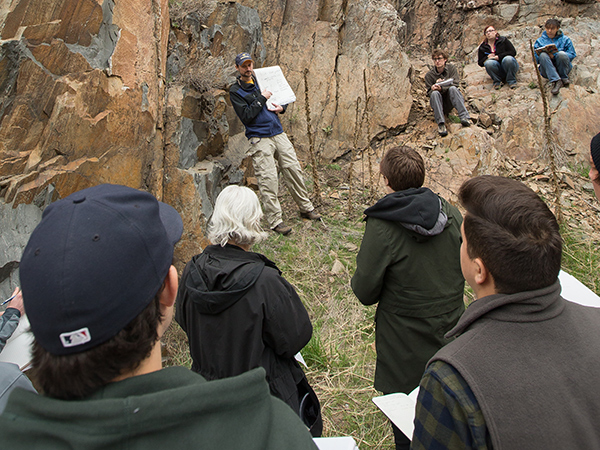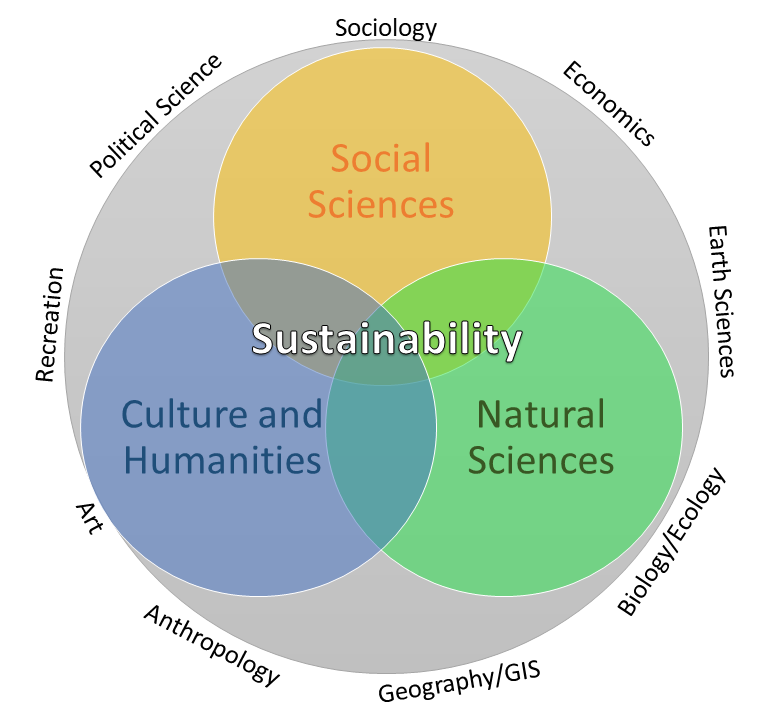UNC Earth and Environmental Network
The UNC Earth and Environmental Network (UNCEEN) is a collaborative effort between Environmental related programs at the University of Northern Colorado. These programs provide education, training, engagement, professional development, outreach, and community building for those interested in different aspects of our understanding and interaction with the physical and biological world.
Students in our Earth and Environmental Network programs are united by their passion for the environment. Christopher Uhl, a biology professor at Penn State who brought Sustainability to the forefront of Higher Education concerns, described his work as making the invisible visible1. Each of our programs develop student understanding and scholarship for our environment and resource use, from the structure and processes of our natural world in Biology or Earth Sciences majors, to how humans use and impact the world today in Environmental Studies, Economics, or Geography majors, to our historic use of resources in Anthropology.

Our Mission
Our mission is to help students connect with and understand the range of environmental programs at UNC. To that end, we've launched a series of social media and networking pages. We encourage students to join and spread the word among environmental colleagues. We'll be posting jobs, internships, workshops, events, and information that we think you may find interesting. We also encourage you to ask questions and provide feedback to each other as you navigate your academic and professional careers.
1 Uhl, Christopher. "Process and practice: creating the sustainable university." Sustainability on campus: Stories and strategies for change (2004): 29-47
How do I find the right major for me?
At UNC, there are several academic tracks to prepare students for environmental careers, because there are many disciplines involved in the science, policy, management, and evaluation of our understanding and use of natural resources.
We have two pathways to finding the right program for you, based on your priorities or passions. Once you narrow your focus, compare the coursework of those programs and chat with faculty if you are seeking more information.
Option 1: Place your priorities
Many of our programs combine aspects of different fields, as shown by this diagram. Perhaps placing your priorities inside this Venn diagram will help you choose the correct academic path; that is, the path that will lead you to your dream career.
For example, if you are interested in research regarding human impacts and environmental systems, biology or earth sciences focus on scientific knowledge and geography or environmental studies investigates the interaction of humans and environmental systems.
However, if you are interested in being a part of policy decisions, conflict resolution, or communications, the Environmental Studies major, Scientific Communication minor, or Parks & Recreation Program may be a better fit.

I want to contribute to our understanding of our natural world...
with a focus on living things like plants, animals, ecosystems and evolution.
- Check out the Ecology and Evolutionary Biology emphasis in our School of Biology.
with a focus on earth systems like air, water, climate and geology.
- Check out the Meteorology, Environmental Sciences, and Geology majors in the Earth and Atmospheric Sciences Department.
and have a strong interest in finding practical solutions to society’s most pressing challenges.
- Check out the Geography and GIS emphases in the Department of Geography, GIS, and Sustainability.
I want to contribute to our understanding of society and decision making...
with a focus on markets, ownership, use, and exchange of scarce resources.
- Check out our Environmental Emphasis of our Economics major.
with a focus on integrating policy, economics, human behavior and environmental systems.
- Check out the Environmental and Sustainability Studies major.
- Check out the Geography and GIS emphases in the Department of Geography, GIS, & Sustainability.
I want to help educate and share my passion for the environment with others...
Check out our programs with secondary education emphases:
I love cultural ecology, digging in the dirt, investigating prehistory and the ancient environment...
with a focus on understanding paleoecology, human prehistory, cultural ecology, and the collapse of civilizations.
- Check out an anthropology major with an emphasis on how modern cultures interact with the environment, the archaeology of ancient civilizations, or reconstructing the environment of human ancestors in the Department of Anthropology.
Our Programs
There are ten major areas of study at UNC that fall under the Earth and Environmental network in multiple colleges across our campus. For more information about the network, contact Dr. Romulo in the Department of Geography, GIS, and Sustainability or Dr. Sharon Bywater-Reyes in the Department of Earth and Atmospheric Sciences.
Career Readiness
This network is a way for students to connect with and understand our environmental programs at UNC. To that end, we've launched a series of social media and networking pages and encourage you to join and add your environmental major and minor colleagues. We'll be posting jobs, internships, workshops, events, and information that we think you may find interesting. We also encourage you to ask questions and provide feedback to each other as you navigate your academic and professional careers.
If you are a current student or alumni, the Career Service's staff can assist you with...
- Deciding a major and careers
- Starting/updating resumes and cover letters
- Discovering job and internship searching techniques and resources
- Searching and applying for graduate programs
- Developing interviewing skills
- Locating career information





